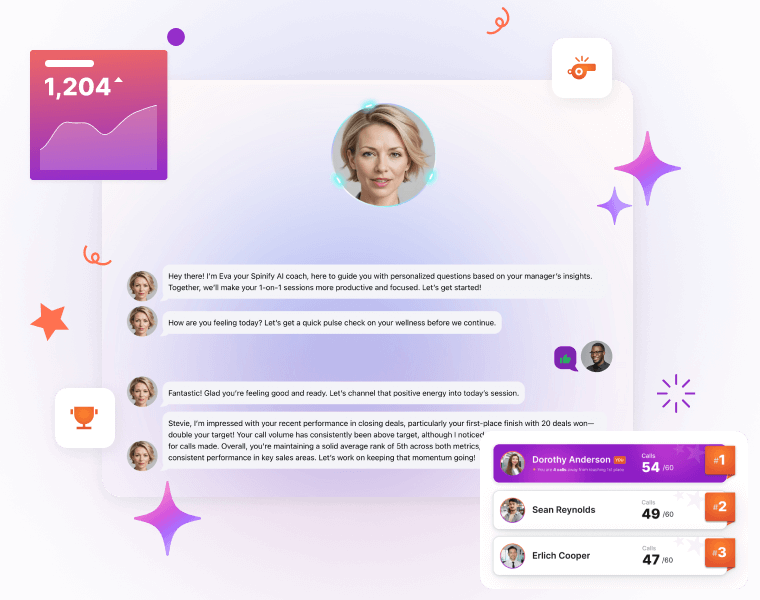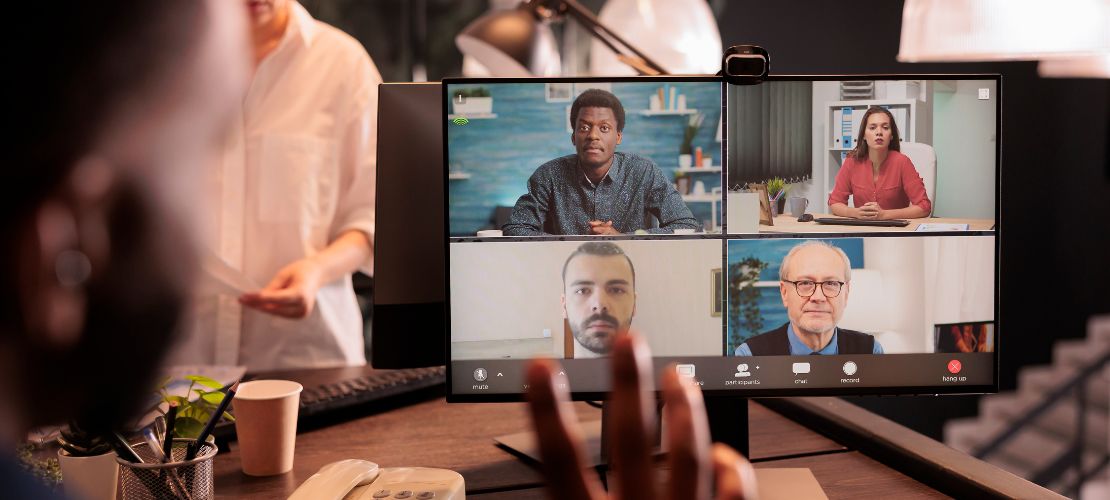Introduction
The rise of remote work has transformed how companies operate, requiring businesses to rethink their workplace culture. A strong remote-friendly company culture fosters employee engagement, collaboration, and productivity—ensuring that remote teams feel connected despite physical distance.
Spinify, a leader in sales performance and engagement, helps businesses build a thriving remote culture through gamification and AI-powered coaching. By leveraging real-time feedback, recognition programs, and AI-driven insights, Spinify creates an environment where remote employees feel motivated and aligned with company goals. In this guide, we explore top strategies for creating a remote-friendly company culture and how technology, especially AI, plays a key role in this transformation.
Why Company Culture Matters in a Remote Environment
In a remote setting, company culture is crucial for fostering employee engagement, collaboration, and productivity. Without a shared physical office space, a strong culture ensures remote employees feel connected and motivated. This connection bridges the gap created by physical distance, promoting a sense of belonging and unity. A clear culture provides remote workers with an understanding of the company’s values and expectations, guiding their behaviors and decisions. This alignment boosts productivity and morale, as employees feel part of a larger purpose.
Moreover, a strong culture encourages innovation and creativity. When employees feel secure, they are more likely to share ideas and collaborate effectively. This leads to innovative solutions that drive the company forward. A positive culture also attracts top talent, as potential employees seek organizations where they can thrive. By investing in a remote-friendly culture, companies can retain their best employees and create a thriving work environment. Prioritizing company culture ensures long-term success and resilience in the changing work dynamics.

Challenges of Building Culture in Remote Teams
Creating a cohesive company culture in remote teams presents unique challenges. Remote employees often feel isolated due to the lack of in-person interactions and shared office space, which can affect morale and productivity. Coordinating meetings and collaboration can be difficult across different time zones. To foster unity, companies must focus on communication and engagement, creating virtual spaces for personal connections and idea-sharing.
Maintaining consistent company culture is challenging without daily interactions to reinforce values. Remote employees may struggle to internalize these values, leading to inconsistencies. Clear expectations and guidelines are essential for communicating culture and values. Digital tools can facilitate regular communication, allowing team leaders to reinforce cultural values through virtual meetings and team-building activities. By proactively building culture, organizations keep remote teams engaged and aligned with company vision, driving hybrid work model success.
The Role of Technology in Strengthening Remote Culture
Technology is crucial for a successful remote-friendly culture, bridging gaps among remote employees and enhancing connectivity. Without physical office space, digital tools like Slack, Microsoft Teams, and Zoom are vital for effective communication. These platforms enable real-time discussions, video calls, and project collaboration, keeping remote teams aligned with company goals. Performance tracking tools like Spinify offer insights into employee engagement and productivity, helping managers make data-driven decisions to boost team performance. By using these technologies, companies can foster a dynamic remote work environment where employees feel connected and motivated.

Moreover, technology personalizes the remote work experience across different industries. AI-driven platforms like Spinify’s AI Coaching Agent provide tailored feedback and coaching, addressing individual strengths and areas for growth. This personalized approach promotes continuous learning and development, boosting employee morale. Additionally, technology supports flexible schedules, allowing employees to work during their most productive hours, leading to significant cost savings on real estate and office space. By investing in the right digital tools, organizations can ensure their remote workforce remains engaged, productive, and aligned with the company’s vision.
Spinify’s AI Coaching Agent: Enhancing Remote Team Performance

Spinify’s AI Coaching Agent is a pivotal tool for boosting remote team performance, offering features to keep remote employees engaged and motivated. It provides real-time feedback, helping employees understand their performance and areas for improvement. By tracking key performance metrics, the AI Coaching Agent ensures remote employees continuously strive for excellence. Spinify’s platform gamifies tasks, turning them into engaging challenges that foster healthy competition and strengthen team dynamics. This integration of AI-driven coaching into remote strategies promotes continuous improvement, ensuring remote teams remain productive and aligned with organizational goals.
Additionally, Spinify’s AI Coaching Agent personalizes the coaching experience for remote employees. By analyzing performance data, the AI tailors feedback to each employee’s needs, empowering them to take charge of their development. This personalized approach fosters accountability and self-motivation. The AI also helps managers identify trends and make informed decisions. Leveraging AI enhances employee engagement and productivity, driving the success of remote work models. As businesses navigate remote work complexities, Spinify’s AI Coaching Agent is essential for cultivating a thriving remote workforce.
Encouraging Open Communication in Remote Work
Open communication is vital for building trust in remote work environments. Without face-to-face interactions, companies must create consistent dialogue channels using tools like Microsoft Teams, Slack, and Spinify. These platforms enable seamless communication, allowing remote employees to share ideas, provide feedback, and collaborate effectively. Establishing open communication fosters inclusivity, enhances employee engagement, and boosts productivity.
Setting clear expectations and providing transparent feedback are crucial. Leaders should prioritize virtual meetings and one-on-one check-ins to discuss goals and celebrate achievements. By maintaining open communication, managers can identify issues early and offer timely support. A transparent culture builds trust, enabling employees to voice opinions and concerns, fostering innovation. Prioritizing open communication cultivates a collaborative, inclusive, and resilient remote work culture, ensuring long-term success.
Virtual Recognition and Employee Appreciation
In remote work settings, employee recognition and appreciation are vital for boosting morale and engagement. Without daily in-person interactions, companies need proactive strategies to ensure remote employees feel valued. Spinify’s gamification and leaderboards effectively highlight achievements in real-time, fostering a culture where accomplishments are celebrated. This recognition not only enhances morale but also creates a sense of belonging and connection among remote teams, reinforcing their alignment with company goals.

Personalizing recognition with tailored messages, shout-outs during meetings, or customized rewards can significantly amplify its impact. Incorporating appreciation into daily workflows ensures consistency and timeliness, helping maintain motivation and engagement. By focusing on virtual recognition and appreciation, companies can cultivate a supportive remote work culture where employees feel valued and motivated to contribute to the organization’s success.
Gamification: A Powerful Tool for Remote Engagement
Gamification transforms routine tasks into engaging experiences for remote teams, introducing friendly competition to keep remote employees motivated. Spinify’s leaderboards, challenges, and rewards create a dynamic environment, fostering camaraderie as team members work towards common goals. By integrating gamification, companies enhance employee engagement and productivity, ensuring remote teams stay connected.
Gamification also recognizes achievements, crucial for maintaining motivation in remote settings. Spinify’s features highlight accomplishments, reinforcing a culture of appreciation. This boosts morale and encourages skill development. By setting clear expectations and offering rewards, gamification empowers remote employees to own their performance. As businesses navigate remote work, incorporating gamification leads to a more engaged workforce, contributing to the success of company culture.
Using Data to Drive Remote Employee Productivity
Effective management of remote teams hinges on data-driven decision-making. Spinify’s AI-powered analytics optimize employee performance and engagement, providing insights into behavior and trends. This enables businesses to offer targeted support and training, ensuring remote employees excel. Data-driven strategies help set measurable goals, track progress, and recognize high-performing employees, fostering a culture of appreciation and motivation.
Incorporating data into decision-making anticipates challenges, allowing for timely interventions to boost morale and engagement. Continuous data monitoring helps businesses adapt to changes, maintaining productivity in remote teams. By leveraging data, companies ensure remote employees not only meet expectations but thrive, enhancing individual and organizational success in the digital landscape.
AI-Powered Feedback Loops for Continuous Improvement
AI-powered feedback loops are transforming remote work by offering personalized coaching and real-time insights that enhance employee performance. These tools provide dynamic employee development by tracking progress and adjusting strategies in real time to meet goals. In the absence of direct oversight, AI tools offer data-driven insights for informed decision-making, fostering a culture of learning and adaptability that keeps remote workers engaged and motivated.

These feedback loops are key to building a cohesive, high-performing remote workforce. By automating feedback, they provide timely insights that fit seamlessly into daily workflows, eliminating delays of traditional reviews. AI-driven feedback identifies skill gaps, enabling personalized learning paths tailored to each employee’s strengths and weaknesses. This approach ensures remote teams meet current expectations and are ready for future challenges, maintaining high levels of engagement and productivity for long-term remote work success.
The Power of Virtual Socialization in Remote Teams
Virtual socialization is essential in remote work for fostering camaraderie and belonging. Activities like virtual happy hours, online team-building games, and Spinify’s social recognition features strengthen team bonds. These interactions allow remote employees to connect personally, bridging the gap of physical distance and enhancing company culture. By encouraging informal gatherings, companies cultivate an inclusive environment where employees feel valued and connected, despite not sharing the same office space.
Additionally, virtual socialization boosts employee morale and engagement. Engaging in fun activities alleviates isolation and enhances productivity and creativity. These interactions foster a positive work environment, encouraging collaboration and idea-sharing. Integrating social recognition, such as acknowledging achievements and celebrating milestones, further motivates teams and reinforces appreciation. Embracing virtual socialization is crucial for maintaining a cohesive and motivated remote workforce, strengthening team dynamics, and contributing to overall success.
Transparency and Trust: The Foundation of Remote Success

Trust is vital for effective collaboration in remote teams, where face-to-face interactions are rare. Leaders can foster trust and transparency by providing regular updates and maintaining open feedback channels. Tools like Spinify offer data-driven performance insights, helping set clear expectations and goals. This empowers remote employees to understand their roles and contributions to the company’s success. An open culture encourages employees to voice concerns and share ideas, leading to a more cohesive and motivated workforce.
Moreover, transparency involves creating a supportive environment where employees feel valued. Regular virtual check-ins and team meetings help recognize achievements and address challenges. Digital platforms bridge physical gaps, nurturing a sense of belonging. This approach boosts morale, engagement, innovation, and productivity. As remote work evolves, maintaining trust and transparency is crucial for long-term success in the hybrid work model.
Enhancing Cross-Department Communication in Remote Work
Breaking down silos in remote organizations requires clear communication channels and integrated technology. Without traditional office interactions, remote teams often face challenges in cross-department communication. Businesses need robust digital platforms like Slack, Microsoft Teams, and Zoom for seamless collaboration, enabling employees to connect across departments easily. Spinify’s AI analytics provide insights into performance and engagement, aiding informed decision-making. These technologies ensure all team members are aligned, promoting a cohesive company culture.

Regular interdepartmental meetings and virtual brainstorming sessions further enhance communication among remote teams. These meetings allow employees to share ideas, discuss challenges, and align on goals, fostering unity and collaboration. Informal virtual gatherings like online coffee breaks or team-building activities build rapport and strengthen relationships across departments. By encouraging personal interactions, companies cultivate a supportive environment that transcends departmental boundaries. This approach boosts morale, engagement, innovation, and productivity, contributing to remote work model success.
Encouraging Self-Motivation in Remote Workforces
Remote employees must stay self-motivated. Spinify’s gamification and AI-driven feedback encourage continuous improvement and self-driven success. Establishing clear expectations and goals provides remote employees with a roadmap for success, enabling them to focus their efforts and measure progress. Flexible schedules further enhance their ability to self-motivate by allowing them to work during their most productive hours.
Creating opportunities for personal connections among colleagues, such as virtual team-building activities and regular video calls, fosters a sense of community and reduces isolation. Recognizing and rewarding achievements through Spinify’s gamification features and leaderboards ignites healthy competition, driving employees to excel. These strategies, combined with a supportive remote work culture, inspire high levels of motivation and engagement.
AI-Driven Personalized Coaching for Remote Employees
Spinify’s AI Coaching Agent provides tailored coaching, enhancing individual performance and team dynamics. By analyzing data, AI identifies trends, aiding managers in making informed decisions that benefit the entire remote workforce.
Continuous Learning and Development in a Remote Environment
AI-powered platforms like Spinify keep remote employees engaged with ongoing training. These tools offer flexible, personalized learning paths, ensuring employees acquire relevant skills at their own pace.

Key Metrics for Measuring Remote Work Success
Tracking engagement, performance, and productivity is crucial. Spinify’s analytics dashboard delivers actionable insights, helping businesses identify areas for improvement and recognize top performers, ensuring sustained productivity and morale.
Conclusion: Strengthen Your Remote Culture with Spinify
Building a remote-friendly company culture requires strategic effort, the right technology, and a commitment to employee engagement. By leveraging AI-driven coaching, real-time feedback, and gamification, Spinify helps companies foster a thriving remote workforce.
Want to build a strong remote-friendly culture?
👉Book a demo with Spinify today and transform your remote team’s engagement and performance!




